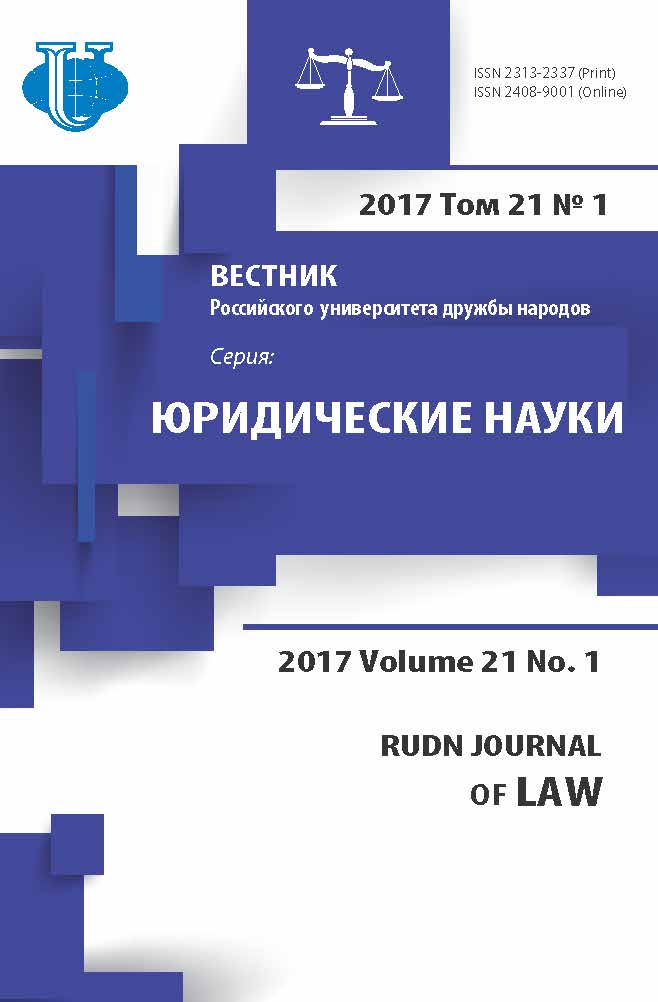Legal Aspects of Gas Industry Regulation in India and Republic of South Africa
- Authors: Volkov A.K1
-
Affiliations:
- National Research University Higher School of Economics - Saint-Petersburg
- Issue: Vol 21, No 1 (2017)
- Pages: 115-135
- Section: Articles
- URL: https://journals.rudn.ru/law/article/view/16092
- DOI: https://doi.org/10.22363/2313-2337-2017-21-1-115-135
- ID: 16092
Cite item
Full Text
Abstract
The present paper is devoted to a study of the legal regulation of the relations in the gas industry of India and RSA. In the first instance the author represents the overall survey of the state of the gas industry in these countries and perspectives of its development. He finds out that they have a lot in common. Both do not have considerable gas reserves, at the same time the demand for the resource is higher than production in the State. However, the Governments endeavor to develop proper production and not to import the gas, to which end the reforms of the legal regulation were undertaken. The present research is accented on the legal sources of regulation in that domain and the role of the international law. In the article the detailed analysis is made on legal regulation of activities of exploration, production of natural gas, on its transportation, distribution, commercialization, import-export activity in India and in RSA. In conclusion the author resumes the results of the comparative legal analysis, estimating the models of regulation, pointing out their weaknesses and possible treatment for its correction. The researcher comes to conclusion that in RSA the clear, comprehensible, codified legislation was elaborated. In the meantime, in India it is not the legislation which was changed but the sub legislative acts. In both States the special regulators were established. Notwithstanding the proclamed policy of deregulation of gas industry in India no unbundling measures were undertaken. The legislation of RSA in its turn foresee the measures of restriction of the abuse of dominant position by vertically integrated companies: the activity should be undertaken with the usage of separate bank accounts, the cross subsidization is forebeeden. If in India in the domain of the gas production the supple form - product sharing agreements is used, in RSA - the license. In both countries there is a State regulation of tarifs, transportation, storage, distribution and gas supply are perfomed in virtue of license. In India the right to acces to transport system is secured only in respect of the one third of the transport capacities. In spite of unsystematicity of indian approach to the regulation unlike RSA this State has reached more significant results: more explorations works were undertaken, more gas is produced.
Keywords
About the authors
Aleksandr K Volkov
National Research University Higher School of Economics - Saint-Petersburg
Email: akvolkov@hotmail.com
Law Faculty 17, Promyshlennaya st., Saint-Petersburg, Russia, 198099
References
- Youseff K., Mutanga Sh. Energy revolution in Africa and its future potential in supplying energy to the world // Thokozani S., Abdel-Rahman M., editors. Energy Transition in Africa. Pretoria 0001; South Africa: Africa Institute of South Africa, 2011. P. 1-18.
- Linde M. van der, editor. Compendium of South African Environmental Legislation. Pretoria; South Africa: Pretoria University Law Press, 2006. 565 p.
- Karanjia V.P. Why India Matters: The Confluence of a Booming Economy, an Activist Supreme Court, and a Thirst for Energy // The Villanova Environmental Law Journal. 2009. Vol. 20. Iss. 1. P. 49-74.
- Cox P.T. Electricity and Natural Gas in India: An Opportunity for India's National Oil Companies // Houston Journal of International Law. 2015. Vol. 37. N 3. P. 893-926.
- Bath D.S. Legal Aspects of Oil and Gas Projects in India // Australian Mining and Petroleum Law Journal. 1999. Vol. 18. N 3. P. 221-240.
- Correau A-S. Natural Gas in India, 2010 // URL: http://www.iea.org/publications/freepublications/publication/natural_gas_india_2010.pdf (Дата обращения: 12.08.2016).
- Défis énergétiques et droit international / sous la dir. de S. Doumbé-Billé. Bruxelles: Larcier, 2011. 376 p.
- Grand E., Veyrenc Th. L’Europe de l’électricité et du gaz. Acteurs, marchés, régulations. Paris: Economica, 2011. 564 p.
- Lemaire Ch. Energie et concurrence: Recherches sur les mutations juridiques induites par la libéralisation des secteurs de l’électricité et du gaz. T. II. Aix-en-Provence: Presses universitaire d’Aix Marseille, 2003. 817 p.
- Chevalier J.-M., Percebois J. Gaz et électricité: un défi pour l’Europe et pour la France. Paris: La documentation française, 2008. 147 p.
- Jain А., Sen A. Natural Gas in India: An Analysis of Policy. 2011 // URL:http://www.oxfordenergy.org/wpcms/wpcontent/uploads/2011/05/NG_50.pdf (Дата обращения: 12.08.2016).
- Devidoss K.A. Energizing the Indian Economy: Obstacles to Growth in the Indian. Oil and Gas sector and Strategies for Reform. Boston College International and Comparative Law Review. 2007. Vol. 30. Issue. 1. P. 199-210.
Supplementary files















